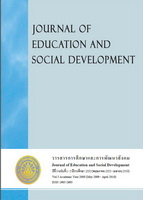พฤติกรรมการดื่มสุราของสตรี ในเขตอำเภอปักธงชัย จังหวัดนครราชสีมาปี 2554
Main Article Content
Abstract
บทคัดย่อ
การสำรวจครั้งนี้เพื่อศึกษาพฤติกรรมการดื่มสุราของสตรีในอำเภอปักธงชัยสำหรับใช้เป็นข้อมูลในการวางแผนกำหนดแนวทางการป้องกันและแก้ปัญหาการดื่มสุราของสตรีโดยเก็บรวบรวมข้อมูลด้วยแบบสอบถามในกลุ่มสตรีอายุระหว่าง 12-65 ปีจากตำบลธงชัยเหนือที่ใช้วิธีการสุ่มแบบหลายขั้นตอนจำนวน 385 ชุด ในระหว่างเดือนมิถุนายนถึงเดือนธันวาคม 2554 สถิติที่ใช้ในการวิเคราะห์ ได้แก่ ค่าความถี่ ค่าร้อยละ ค่าเฉลี่ย ค่าความเบี่ยงเบนมาตรฐาน
ผลการศึกษาพบว่า ร้อยละ 41.1 ของกลุ่มเป้าหมายอยู่ในวัยทำงานที่มีอายุระหว่าง 20-40 ปี มีอาชีพรับจ้างร้อยละ 36.9 จบชั้นประถมศึกษาร้อยละ 42.3 สถานภาพสมรสคู่ร้อยละ 62.9 และร้อยละ 14.5 เป็นหม้าย หย่าร้อยละ 71.1 อยู่กับครอบครัวที่มีจำนวนสมาชิก 4-6 คน สตรีส่วนใหญ่ไม่มีบทบาทใดๆในสังคม รายได้เพียงพอร้อยละ 66 มีประสบการณ์ดื่มสุราร้อยละ 42.1 และเริ่มดื่มในกลุ่มอายุ 25 ปีขึ้นไปร้อยละ 42 ส่วนอายุต่ำสุดที่เริ่มดื่มคือ 13 ปี สตรีส่วนมากดื่มเบียร์ร้อยละ 40.7 ดื่มร่วมกับเพื่อนร้อยละ77.2 มักดื่มที่บ้านตัวเองและบ้านเพื่อน ร้อยละ33.3 และ 27.8 ตามลำดับ สาเหตุที่ดื่มครั้งแรกเนื่องจากงานสังสรรค์และฉลองในโอกาสสำคัญ ร้อยละ 42.6 และ 25.9 จะดื่มช่วงเย็นถึงค่ำมากที่สุดร้อยละ 81.4 ในปัจจุบันพบว่าสตรียังคงดื่มสุราร้อยละ77.9 ค่าใช้จ่ายในการดื่มสุราครั้งละไม่เกิน 150 บาทร้อยละ 76.4 เดือนละไม่เกิน 800 บาทร้อยละ 74 ร้อยละ 30.7 ดื่มสุรานานกว่า 20 ปีดื่มไม่เกิน 5 ปีและไม่เกิน 10 ปีร้อยละ 21.3 และ 20.5 ตาม ลำดับ พฤติกรรมการดื่มอยู่ระดับเสี่ยงและเสี่ยงสูงเท่ากันร้อยละ45.7 ส่วนระดับติดและอันตรายร้อยละ7.1 และ 1.6 ตามลำดับ พบว่ามีคนใกล้ชิดทั้งที่อยู่และไม่อยู่ในครอบครัวดื่มสุราร้อยละ 36.9 และ 39.7 ตามลำดับ พฤติกรรมของคนในครอบครัวหลังดื่มสุราคือทำลายข้าวของร้อยละ 43.9 ส่วนพฤติกรรมของคนใกล้ชิดที่ไม่อยู่ในครอบครัวหลังดื่มสุราคือ อารมณ์ดีและสนุกสนานร้อยละ 47.1 ร้านค้าทั้งในและนอกชุมชนเป็นแหล่งที่หาซื้อสุราได้มากที่สุดร้อยละ79.5 และ 57.7 ตามลำดับ วิธีการเดินทางไปหาซื้อในชุมชนคือเดินร้อยละ 21.8 ส่วนนอกชุมชนจะใช้จักรยานยนต์ร้อยละ 22.9 ไปหาซื้อเองร้อยละ 26.8 และสามารถซื้อได้ตลอดเวลาร้อยละ 8.6 การรับรู้ถึงผล กระทบจากการดื่มสุราระดับดีมากร้อยละ40.0 แต่ค่านิยมของการใช้สุราในชุมชนอยู่ในระดับสูงถึงสูงมากร้อยละ 69.9 สื่อและโฆษณาต่าง ๆ มีผลต่อความรู้สึกอยากดื่มร้อยละ55 จะเห็นได้ว่าสตรีที่มีประสบการณ์ดื่มสุราส่วนมากยังคงการดื่ม แต่ดื่มอยู่ในระดับความเสี่ยงไม่สูงมากนัก และเมื่อดื่มเป็นเวลานานจะกลายผู้ติดสุรา ซึ่งใช้สุราเพื่อการฉลองในโอกาสสำคัญและงานสังสรรค์รื่นเริง และยังมีบุคคลใกล้ชิดดื่มสุรา ถึงแม้จะรับรู้ถึงผลกระทบจากการดื่มสุราแต่ก็ยังคงให้คุณค่ากับการใช้สุรามาก อีกทั้งการตลาดของผู้ผลิตทำให้สุราสามารถเข้าถึงผู้บริโภคได้ง่าย ข้อเสนอแนะจึงจำเป็นต้องสร้างสิ่งทดแทนและค่านิยมในการสร้างสุขแทนการใช้สุรา รวมถึงเพิ่มมาตรการการบังคับใช้กฎหมายควบคุมการจำหน่ายสุราและการโฆษณาอย่างจริงจัง
คำสำคัญ : พฤติกรรม/ การดื่มสุรา/ สตรี
Abstract
The purpose of this research was to investigate the alcohol drinking behavior of women in Amphur Pakthongchai, Nakhonratchasima. This result will be used for setting preventive direction and problem solving of alcohol drinking in the women. The sample for this research included 12-65 years old women who are living in Thongchai Nua. The instruments for collecting research data was the multistage random sampling questionnaires. The survey was conducted with 385 respondents during June-December 2011. The statistic tools including percentage, frequency distribution, mean, standard deviation were applied to evaluate the result for this research. The result shows that 41.1% of target groups are at the working age of 20-40 and 36.9% are employed. The educational backgrounds at primary school are accounted to 42.3%. The marital statuses are as high as 62.9% get married and 14.5% widow and separated from their husbands. Most of them lived with 4-6 members’ families which are counted to 71.1% and no social status. However 66% of them could earn enough money for living. In addition 42.1% have alcohol drinking experience and they start to drink at 25 year old this accounted to 42.0% however the lowest alcohol drinking age was 13 year old. Most of the women drink beer counted to 40.7% among women alcohol drinkers. They usually drink with their friend’s amount to 77.2 % and drink at their own houses or their friends’ houses are 33.3% and 27.8% respectively. These women initially drink in the party and special occasion accounted to 42.6% and 25.9% respectively. The drinking periods mostly are in evening till night which counted to 81.4%. Currently 77.9% of the women still drink alcohol beverage and spent less than 150 baht per one time and not more than 800 baht per month for such beverage which could count to 76.4% and 74.0% respectively. Moreover 30.7%, 20.5% and 21.3% of women drinkers drink more than 20 years, less than 10 and 5 years respectively. Women drinking behavior defined at risk and high risk level are equally counted to 45.7% and 7.1% be alcohol dependence and 1.6% is drinking at harmful level. The family member and non-family intimate drinkers are accounted to 36.9% and 39.7% respectively and 43.9% of family member destroy everything after drinking. On the other hand non- family intimate amount to 47.1% feel enjoy and funny after drink. Most of alcohol drinkers’ account to 79.5% often buys liquor from grocery store in their community and 21.8% walk to the stores; 57.7% buy from outside community and 22.9% ride motorcycle to the grocery. The 26.8% of alcohol drinkers buy for themselves and 8.6% could buy anytime. Although 40.0% of alcohol drinking are highly aware of the negative impact but 69.9% believe at high to very high level in alcohol drinking as social value. The alcohol drinkers’ amount to 55% could be activated by liquor advertisement and media. The main finding is that women who have consumed still drink alcohol but not so risky level. In case they continue to drink they will be alcohol dependence. They usually drink in the party or the special occasion. Although they are aware of the negative effect of alcohol drinking they still like to drink because they believe that alcohol drinking is social value. Moreover the marketing strategies of liquor producers make alcohol drinkers gain more accessibility and could motivate and attract more alcohol drinkers. Therefore the new social value should be of making happily life to replace existing alcohol drinking value need to be instilled to prevent more new drinkers. In addition the law and regulation also need to be seriously enforced to control liquor selling and advertising.

